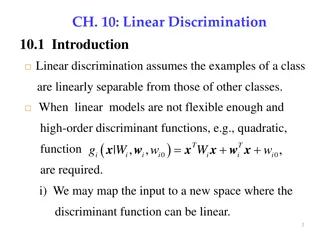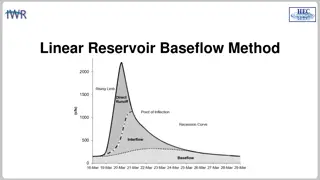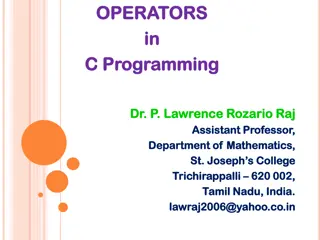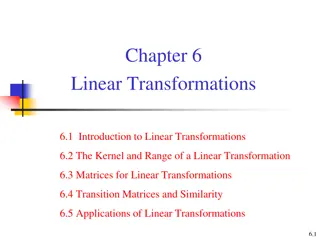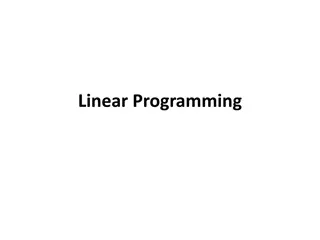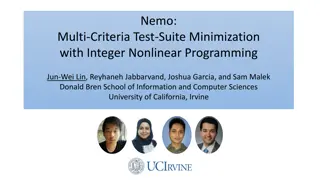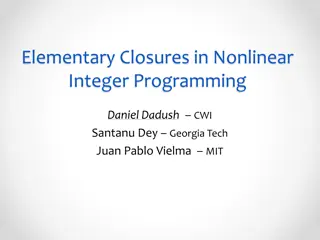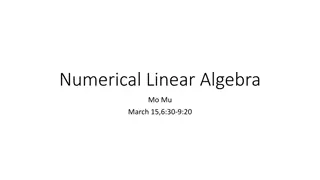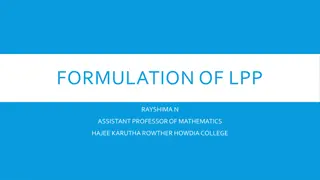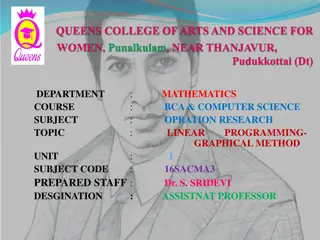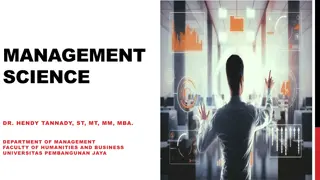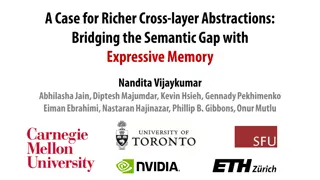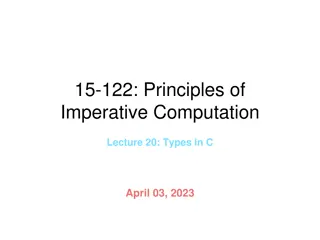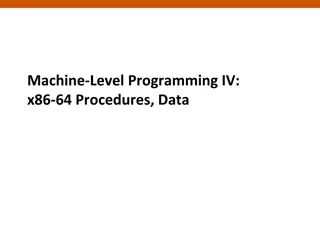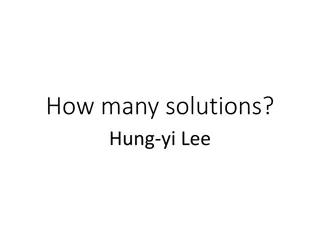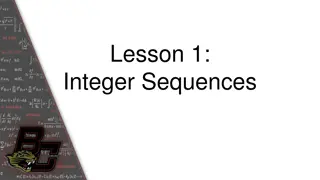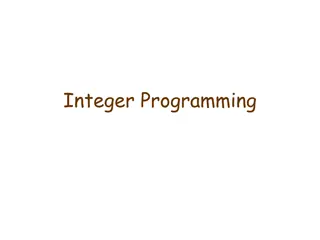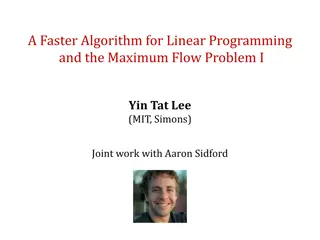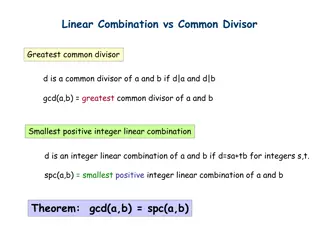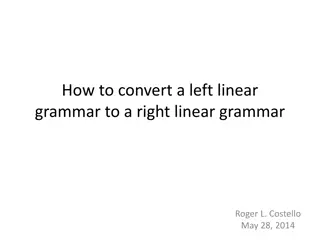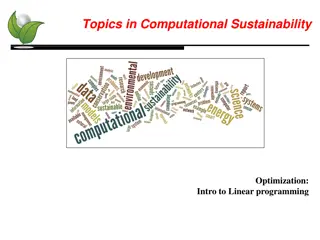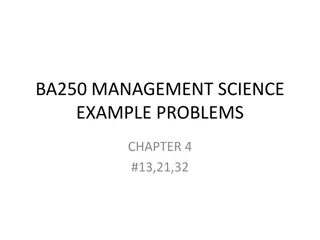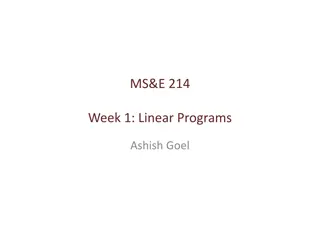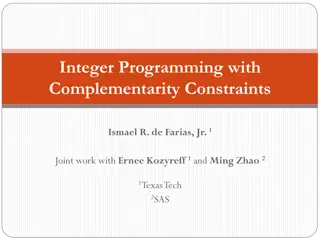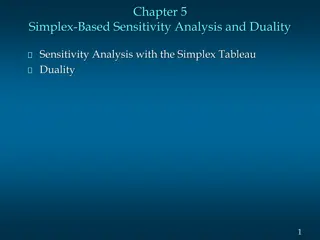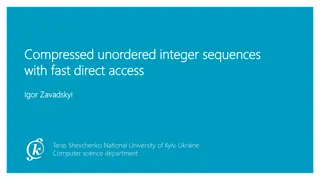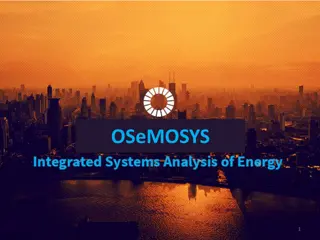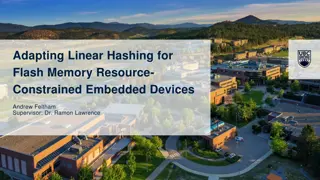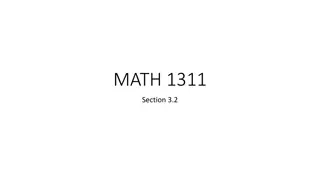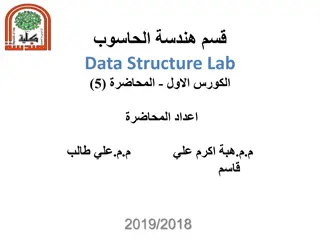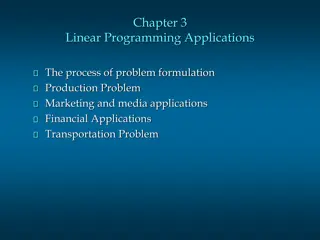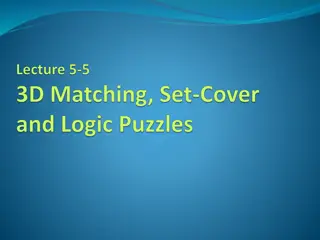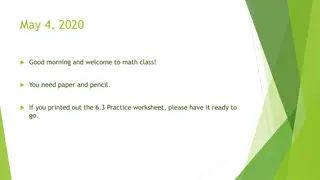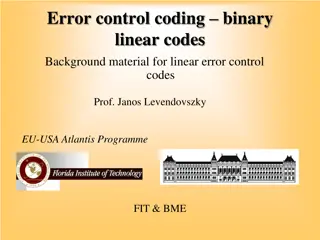Programming in C: Overview and Constants Explanation
Programming in C is a fundamental introductory guide to the C programming language. It covers the basics of C, including its development history, character set, constants, and rules for constructing constants like integer and real constants. Dr. M. A. JAMAL MOHAMED YASEEN ZUBEIR, an Assistant Profes
4 views • 33 slides
Linear Discrimination for Classification
Linear discrimination is a method for classifying data where examples from one class are separable from others. It involves using linear models or high-order functions like quadratic to map inputs to class separable spaces. This approach can be further categorized as class-based or boundary-based, e
3 views • 37 slides
Decision Analysis and Operations Research in Management
This content delves into Management Decision Analysis and Operations Research techniques such as Linear Programming, Integer Linear Programming, Dynamic Programming, Nonlinear Programming, and Network Programming. It covers the phases of an Operations Research study, mathematical modeling for decisi
0 views • 36 slides
Linear Reservoir Baseflow Method
The linear reservoir baseflow method utilizes linear reservoirs to simulate the movement of water infiltrated into the soil. This method models water movement from the land surface to the stream network by integrating a linear relationship between storage and discharge. Users can select from one, tw
0 views • 11 slides
Arithmetic Operators in C Programming
C programming language provides various arithmetic operators such as addition, subtraction, multiplication, division, and modulo division. Integer division truncates any fractional part, while modulo division produces the remainder of an integer division. When operands in an arithmetic expression ar
1 views • 18 slides
Linear Transformations and Matrices in Mathematics
Linear transformations play a crucial role in the study of vector spaces and matrices. They involve mapping vectors from one space to another while maintaining certain properties. This summary covers the introduction to linear transformations, the kernel and range of a transformation, matrices for l
1 views • 85 slides
Linear Programming: An Introduction to Optimization
Linear programming, introduced by mathematician George B. Dantzig in 1947, is a mathematical technique for optimizing resource allocation in a systematic manner. It involves formulating linear relationships among variables to achieve desired results like cost minimization or profit maximization. Lin
2 views • 60 slides
Multi-Criteria Test Suite Minimization with Integer Nonlinear Programming
The study introduces a method for minimizing test suites using Integer Nonlinear Programming. It addresses regression testing challenges, such as managing large numbers of test cases, through Multi-Criteria Test Suite Minimization (MCTSM). The research explores the application of Integer Programming
1 views • 34 slides
Advances in Integer Linear Programming and Closure Techniques
Explore cutting planes, convex integer programming, Chvátal-Gomory cuts, and closure methods in nonlinear integer programming. Discover how these techniques enhance the efficiency and effectiveness of integer programming models, leading to substantial progress and improved solutions.
1 views • 40 slides
Discrete Optimization in Mathematical Modeling
Discrete Optimization is a field of applied mathematics that uses techniques from combinatorics, graph theory, linear programming, and algorithms to solve optimization problems over discrete structures. This involves creating mathematical models, defining objective functions, decision variables, and
1 views • 12 slides
Comprehensive Overview of Numerical Linear Algebra Methods for Solving Linear Systems
Explore numerical linear algebra techniques for solving linear systems of equations, including direct and iterative methods. Delve into topics like Gaussian elimination, LU factorization, band solvers, sparse solvers, iterative techniques, and more. Gain insights into basic iterative methods, error
6 views • 12 slides
Formulation of Linear Programming Problems in Decision Making
Linear Programming is a mathematical technique used to optimize resource allocation and achieve specific objectives in decision-making. The nature of Linear Programming problems includes product-mix and blending problems, with components like decision variables and constraints. Various terminologies
1 views • 14 slides
Linear Programming - Graphical Method in Operations Research
This presentation explores the application of linear programming using the graphical method in the field of Operations Research. Dr. S. Sridevi, Assistant Professor, delves into the concepts and techniques involved in solving optimization problems through graphical representations. The slides cover
0 views • 24 slides
Linear Programming: A Tool for Optimizing Business Operations
Explore the application of linear programming in business, as exemplified by the case study of San Miguel Corporation. Learn how linear programming models can help maximize profits, optimize resource allocation, and streamline decision-making processes in various industries. Discover the fundamental
1 views • 19 slides
Introduction to Integer, Char, and Float Data Types
This content introduces the fundamental data types in programming - Integer, Char, and Float. It includes binary representations, images, and related slides. Explore the characteristics and usage of these data types in programming.
1 views • 9 slides
Evolution of Integer Sizes in C Programming
The evolution of integer sizes in C programming is explored, from early computers with 8-bit addresses to modern systems with 64-bit pointers. The variations in integer sizes, pointer sizes, and memory capacities over decades are highlighted, showcasing the advancements in computing technology.
0 views • 45 slides
x86-64 Procedures and Data Structures
This content provides insights into x86-64 programming, covering topics such as procedures, integer registers, stack frames, locals in the red zone, interesting features of stack frames, arrays, multi-dimensional structures, and more. It dives into the usage conventions of integer registers, the all
1 views • 44 slides
Linear Dependent and Independent Vectors
In linear algebra, when exploring systems of linear equations and vector sets, it is crucial to distinguish between linear dependent and independent vectors. Linear dependence occurs when one vector can be expressed as a combination of others, leading to various solutions or lack thereof in the give
0 views • 20 slides
Integer Sequences and Terms
Explore the concepts of integer sequences, including infinite and finite sequences, terms of a sequence, and nth term formulas. Learn to classify sequences as finite or infinite and find specific terms in a sequence. Gain a comprehensive understanding of notation and terminology used for describing
3 views • 23 slides
Introduction to Integer Programming in Production Planning
Integer programming, a technique rooted in military logistics during WWII, is widely used in various industries due to its ability to model real-life situations efficiently. By formulating problems in a standard form and utilizing algorithms, integer programs can optimize decision-making processes.
0 views • 10 slides
A Faster Algorithm for Linear Programming and the Maximum Flow Problem
A comprehensive overview of a new algorithm for linear programming and the maximum flow problem developed by Yin Tat Lee and Aaron Sidford from MIT and Simons. The algorithm aims to improve efficiency by reducing the number of iterations required to reach the optimal solution. It discusses the histo
0 views • 40 slides
Linear Combinations and Common Divisors Theorem
Exploring the relationship between linear combinations and common divisors through the theorem connecting the greatest common divisor (GCD) and the smallest positive integer linear combination (SPC) of two integers a and b. The theorem states that the GCD is less than or equal to the SPC, with proof
0 views • 45 slides
Converting Left Linear Grammar to Right Linear Grammar
Learn about linear grammars, left linear grammars, and right linear grammars. Discover why left linear grammars are considered complex and how right linear grammars offer a simpler solution. Explore the process of converting a left linear grammar to a right linear grammar using a specific algorithm.
0 views • 44 slides
Linear Programming for Recreational Site Planning
Learn about linear programming applied to recreational site planning with a specific case study involving Nature Connection and their allocation of forested wilderness and sightseeing park areas. Explore the components of linear programming models, steps in setting up a linear program, and the formu
0 views • 36 slides
Linear Programming Models for Fertilizer Production, Metal Stamping, and Coffee Blending
The examples provide real-world scenarios requiring the formulation of linear programming models. The first involves the Kalo Fertilizer Company deciding on daily production quantities of two lawn fertilizer brands given resource constraints, costs, and demand. The second scenario explores the optim
0 views • 4 slides
Linear Optimization in MS&E 214
Linear optimization involves maximizing or minimizing a linear function subject to constraints. This week's focus in MS&E 214 is on linear programming, basic feasible solutions, duality theory, and extreme point solutions. The concept of linear programs, such as the example of maximizing x + 3y subj
0 views • 36 slides
Integer Programming with Complementarity Constraints by Ismael R. de Farias, Jr.
This work by Ismael R. de Farias, Jr. explores Integer Programming with Complementarity Constraints, focusing on problem definitions, formulations, SOS1 branching, cutting planes, and computational results. The study includes applications in transportation scheduling and map display, along with comp
0 views • 21 slides
Sensitivity Analysis and Duality in Linear Programming
Sensitivity analysis in linear programming involves studying the impact of changes in objective function coefficients and constraint right-hand side values on the optimal solution. It helps in determining the range of optimality for coefficients and shadow prices for constraints. Duality analysis ex
0 views • 33 slides
Advanced Compression Techniques in Unordered Integer Sequences
Presenting innovative methods for compressing and accessing unordered integer sequences efficiently. Explore fast element extraction and direct addressable variable-length codes to optimize memory usage and enhance data handling. Cutting-edge research from top universities and workshops is showcased
0 views • 8 slides
OSeMOSYS: Energy System Modelling and Linear Programming
Energy systems modelling with OSeMOSYS involves linear programming to determine the optimal energy system configuration. The tool considers factors like demand, available technologies, emissions, and constraints to minimize costs over decades. Linear programming, developed during World War II, plays
0 views • 15 slides
Adapting Linear Hashing for Flash Memory Constrained Embedded Devices
This research explores the adaptation of linear hashing for improved data handling on flash memory-constrained embedded devices. Motivated by the increasing data collection by IoT devices, the study focuses on implementing database structures like a linear hash table for efficient data processing. T
0 views • 67 slides
Computer Programming Principles
Dive into the world of computer programming, covering high-level and machine languages, compilers, interpreters, writing programs, top-down design, and the array of programming languages available. Understand the essentials of building code to control computers, the diversity of programming language
0 views • 23 slides
Linear Functions in Mathematics
Linear functions play a crucial role in mathematics, focusing on elements like rate of change and initial value. Through examples involving daily car rental costs and profit from selling birdhouses, this content explores the concept of linear functions and how they are applied in real-life scenarios
0 views • 13 slides
Key Concepts in AP Computer Science A Exam Review
Essential topics covered in AP Computer Science A Exam include identifiers, primitive data types, number representation, final variables, and arithmetic operators. Recognizing the basics, such as types, identifiers, operators, and control structures, is crucial for success in the exam. Understanding
0 views • 100 slides
Constants and Literals in C++ Programming
Constants and literals in C++ are fixed values that the program cannot alter. They come in various types such as integer numerals, floating-point numerals, characters, strings, and boolean values. Integer literals can be decimal, octal, or hexadecimal constants, while floating-point literals have in
0 views • 7 slides
Linear Programming Applications in Production and Marketing
Exploring linear programming applications in production and marketing, this content delves into problem formulation, production level optimization, demand forecasting, cost considerations, and media selection strategies. Detailed examples and mathematical formulations are provided to demonstrate the
0 views • 26 slides
Combinatorial Optimization in Integer Programming and Set-Cover Problems
Explore various combinatorial optimization problems such as Integer Programming, TSP, Knapsack, Set-Cover, and more. Understand concepts like 3-Dimensional Matching, SAT, and how Greedy Algorithms play a role. Delve into NP-Hard problems like Set-Cover and analyze the outcomes of Greedy Algorithm se
0 views • 60 slides
Linear and Nonlinear Functions in Mathematics
Explore the concepts of linear and nonlinear functions in mathematics through identifying linear and nonlinear functions from graphs, understanding the characteristics of linear functions, and identifying linear functions from tables. Learn about the constant rate of change, slope, and how to determ
0 views • 49 slides
Linear Error Control Coding and Syndrome Detection in Binary Linear Codes
Delve into the world of linear error control coding, guided by Prof. Janos Levendovszky, as we explore the development of linear codes, message vectors, error groups, and the process of selecting group leaders with detailed examples. Discover how syndrome detection and decoding tables play a crucial
0 views • 27 slides
Insights on Linear Programming and Pivoting Rules in Optimization
Linear programming involves maximizing a linear objective function within a set of linear constraints to find the optimal point in a polytope. The simplex algorithm, introduced by Dantzig in 1947, navigates through vertices to reach the optimal solution. Deterministic and randomized pivoting rules,
0 views • 30 slides

